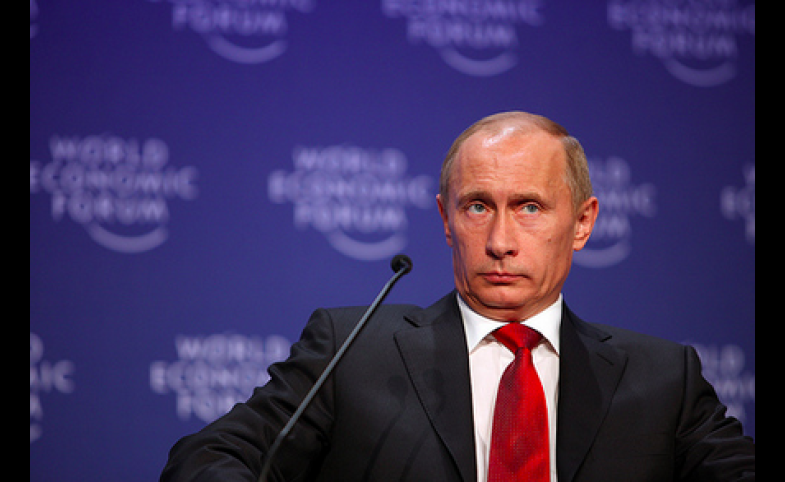“A decent respect to the opinions of mankind,” intones the U.S. Declaration of Independence, requires that those who want to break away from a nation-state explain publicly their reasons for doing so. Today, however...
KEEP READINGThe CPD Blog is intended to stimulate dialog among scholars and practitioners from around the world in the public diplomacy sphere. The opinions represented here are the authors' own and do not necessarily reflect CPD's views. For blogger guidelines, click here.

Punish Putin by Opening the Door to Russia's Best and Brightest
Immigration policy was the first weapon used to punish Vladimir Putin and his cronies following their Crimean consumption.
Travel sanctions were imposed and U.S. visas denied to a handful of Putin colleagues with the intended message being: You are criminals and unwelcome in the United States.
Putin's actions may have had the perverse effect of forcing the only enacted U.S. immigration policy this year. In a world of limited sanctions and no military options, strategic immigration policy could be a weapon used more broadly to stick it to the Kremlin. Keeping out the bad guys is a good idea; opening the door to the good guys might be an even better one.
Realistically, the sanctioned individuals are not crying in their vodka over denied visits to Miami Beach. They are already seemingly set for life, relaxing in their suburban Moscow dachas and summering in Sochi.
Nevertheless, President Barack Obama ordered these undesirables to stay out of the United States. If immigration can be used negatively, however, it should also be used positively.
While Congress seems unwilling to take on any immigration legislation, the president can invite threatened Russian regime opponents, religious and ethnic minorities, and the broader creative class to the United States before they start facing heightened persecution at home. It should be an integral part of a comprehensive and strategic immigration policy.
A new orgiastic nationalism has just been born in Russia and the victims are not going to be limited to Euro-Ukrainians. They also include Russians who believe that patriotism is born in dissent and diversity - those who understand that patriotism is not nationalism.
This new Russian fervor was on full display when Putin spoke to his country last week from the ornate St. George Hall of the Grand Kremlin Palace, spelling out for both houses of parliament his view of historic indignities and injustice perpetrated against the greater Russian nation.
Putin's defiant speech further defined the basis of Russian exceptionalism and superiority. It ominously warned any foreign and domestic forces that question, threaten or oppose his vision.
While his speech also checked the box and recognized the multiethnic character of his new Russian empire, his inclusive words do not match his exclusive vision of the 21st century.
In fact, despite its coffer-filling energy revenues, Russia is already in a losing game in the 21st and Twitter were not invented in Putin's Russia. The future of technology does not have a despotic authoritarian face. Creativity requires freedom of thought and expression. As former Secretary of State Hillary Clinton put it during a 2012 speech in Mongolia, "Countries that want to be open for business but closed to free expression will find the approach comes with a cost."
One cost should be giving Russia's best and brightest a Western option to find both fertile creative ground and political space.
It is time again for the United States to be an activist nation in its immigration policies and reject rising homegrown isolationist tendencies. America's promise is filled by welcoming "the rebels, the troublemakers, the round pegs in the square holes. The ones who see things differently," as an Apple Computer advertisement once distilled it.
Google co-founder Sergey Brin was born in Russia, but he came alive in the United States. There are many more like Brin who will feel captive in a country now heading down a darker path.
Hyper-nationalism in Europe has historically been the breeding ground for anti-Semitism and anti-gay persecution. Despite Putin's tip of the hat to Russian diversity and inclusion in his recent triumphalist speech, the emotional forces he has unleashed might be uncontrollable.
It is troublesome to have a country with so much power and potential go it alone in a world that should be moving closer together. It is a shame they will suffer brain drain. As a result, the seeds of Russian democracy may need to sprout outside the country if domestic opponents are increasingly incarcerated, threatened, or forced to flee.
In the same way the West needs to create a strategic comprehensive energy policy to counter Russia's rising power, it also needs a new coordinated, strategic, comprehensive and flexible immigration policy.
President Obama's instincts to use immigration strategically was a good one; the use of an executive order is efficient. Domestic political debates should not get in the way of using American visas as an effective foreign policy tool. If you need more proof, Google it.
This piece was originally published on The Sacramento Bee.
To read the original piece, click here.
Visit CPD's Online Library
Explore CPD's vast online database featuring the latest books, articles, speeches and information on international organizations dedicated to public diplomacy.
POPULAR ARTICLES
-
January 29
-
January 20
-
December 17
-
January 28
-
December 15
Join the Conversation
Interested in contributing to the CPD Blog? We welcome your posts. Read our guidelines and find out how you can submit blogs and photo essays >.













